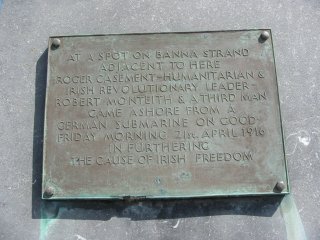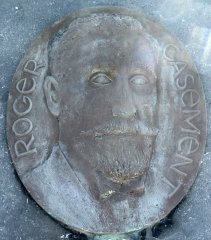 |
13. Roger Casement |
|||
|
The Republic of Ireland and the United Kingdom are two countries separated by a common history. In the Irish version, Dublin-born Sir Roger Casement (1864-1916) was a hero of the struggle for independence. In the British version, he was a traitor. At the outbreak of the First World War, he sought German help to win Irish independence. He arranged for an arms shipment to be delivered to Ireland on a German ship, the Aud, on the eve of the Easter Rising (23rd April 1916). The ship was seized by the British and scuttled. Casement, who came ashore on Banna Strand from a German submarine, was arrested, and put on trial at the Old Bailey for treason. He was convicted and hanged at Pentonville Prison. His remains were returned to Ireland for reburial in 1960.
At the time of the trial his 'Black Diaries' exposed him as a promiscuous homosexual, losing him much public sympathy. These diaries were long believed to be forgeries, particularly in Ireland, but in 2002 the results of a forensic study sponsored jointly by BBC and RTE established beyond doubt that they were Casement's.
For more information, see Paul Tilzey, 'Roger Casement: Secrets of the Black Diaries', on the BBC website (link correct on 11th June 2004).
|
||
|
||
Marie, Conor, and Gareth on the Casement Memorial; the inscription and portrait of Roger Casement. The inscription reads: 'At a spot on Banna Strand adjacent to here Roger Casement - humanitarian & Irish revolutionary leader - Robert Monteith & a third man came ashore from a German submarine on Good Friday morning 21st April 1916 in furthering the cause of Irish freedom.' |
 |
13. Roger Casement |
|||
|






